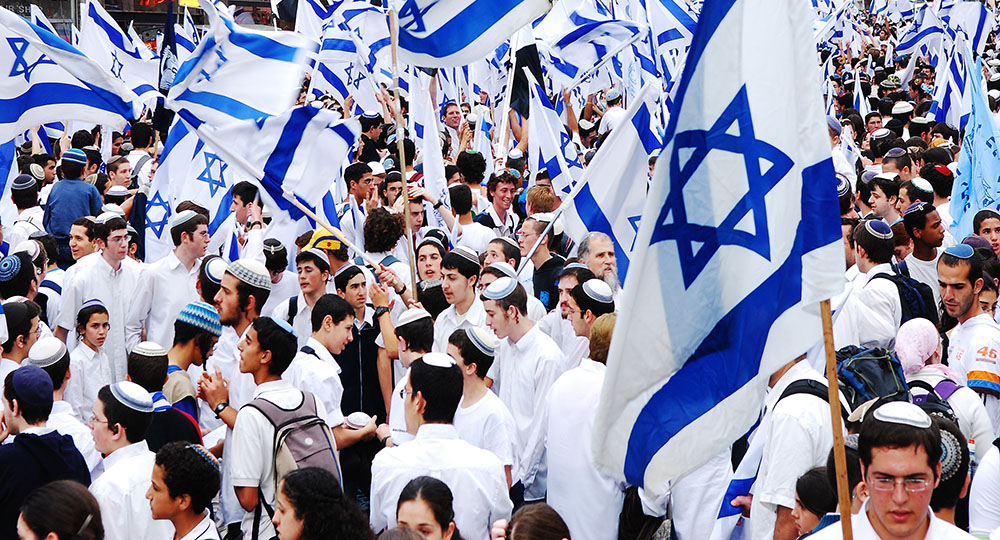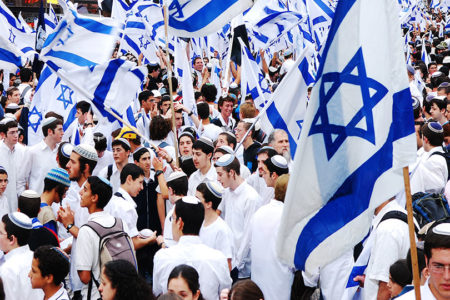No Place Like Home
Aliyah—and its special place in the Jewish heart.
A bump on the head and a trip to Oz was all it took for Dorothy to realize there’s no place like home. Dorothy is the main character in L. Frank Baum’s children’s book The Wonderful Wizard of Oz, popularized in the 1939 film, The Wizard of Oz. After being knocked out during a tornado, Dorothy wakes up in the fantasy land of Oz, where she searches desperately for the way back home.
Jewish people making aliyah probably share the same sentiment as Dorothy: “There’s no place like home.” Aliyah (Hebrew for “ascent” or “the act of going up”) is the word used for Jewish immigration to Israel, which has long been a motivating force in Zionism and a core principle and conviction of the movement. No surprise, then, that Israel has a national holiday called Yom HaAliyah (Day of Aliyah). This year it begins at sundown on March 22.1
Aliyah in the Jewish Scriptures
Aliyah has helped build the nation of Israel. The opening clause of the Aliyah Day law states the law’s purpose: to “recognize the importance of Jewish immigration” and to “mark the date of entry into the Land . . . on the tenth of Nisan,” as recorded in the book of Joshua: “Now the people came up [past-plural verb form of aliyah] from the Jordan on the tenth day of the first month [Nisan], and they camped in Gilgal on the east border of Jericho” (4:19, emphasis added).
From that time forward, there has always been a Jewish presence in the land. Though at times God removed His people due to their disobedience, He always promised to bring them back.
In 586 BC, God used the Babylonians to exile them to Babylon. Seventy years later (Jer. 25:12), He used Cyrus, king of Persia, to bring them back. “Who is among you of all His people?” Cyrus asked. “May the LORD his God be with him, and let him go up” (2 Chr. 36:23, emphasis added; cf. Ezra 1:3). As a result of Cyrus’s decree, 42,360 Jewish people made aliyah to Judah, accompanied by 7,337 slaves and 200 singers (Ezra 2:64–65), including members of the 10 northern tribes.
Jewish eschatology holds to a future aliyah, alluded to each year at Passover. As the Seder meal concludes, participants declare, “Next year in Jerusalem!” a prophetic reminder of God’s promise to Israel: “I will gather you from the peoples, assemble you from the countries where you have been scattered, and I will give you the land of Israel” (Ezek. 11:17, cf. 36:24, 28).
Aliyah in Secular Jewish History
The scattering of the Jewish people, known as the Diaspora, began in AD 70 when the Romans demolished Jerusalem and destroyed the Temple, leaving a small remnant in the land. From then on, returning home became a dream, a deep longing within Jewish hearts.
It remained that way for 1,800 years until European-Jewish journalist Theodor Herzl arrived on the scene. In 1897 in Basel, Switzerland, Herzl convened the First Zionist Congress to work on a plan to secure a homeland for the Jewish people. The dream became a challenge for Herzl, who wrote, “If you will it, it is no dream.”
As its anthem, the Congress adopted the poem Hatikvah (“The Hope”), later to become Israel’s national anthem. Its sentiments express the dream of returning home:
As long as within our hearts the Jewish soul sings,
As long as forward to the East, to Zion, looks the eye–
Our hope is not yet lost, it is two thousand years old,
To be a free people in our land, the land of Zion and Jerusalem.2
The importance of aliyah is woven into the fabric of the state’s Declaration of Independence: “After being forcibly exiled from their land, the people kept faith with it throughout their Dispersion and never ceased to pray and hope for their return to it and for the restoration in it of their political freedom.”3
Before 1948. After the First Zionist Congress, Herzl wrote in his journal, “At Basel I founded the Jewish state. . . . In five years perhaps, and certainly in fifty years, everyone will perceive it.” Herzl was only a year off. During that time, Jewish persecution in Poland, Russia, Romania, Germany, Yemen, and Bulgaria spurred seven distinct waves of aliyah, bringing half a million Jewish people home.
After 1948. In 1948, only 650,000 Jewish people lived in the new State of Israel. But between 1948 and 1951, immigration doubled the population to 1,330,000. According to the Jewish Virtual Library, “Since Israel’s founding, 3.3 million people have immigrated to the country, 44% of them arriving since 1990.”4
The largest ethnic group has come from Russia.5 Between 1977 and 2006, more than 1 million olim (immigrants) came from the former Soviet Union. Ethiopian Jews came via Israel’s Operation Moses and Operation Solomon, which rescued thousands in merely days. Today more than 8,000 Jewish Ethiopians still desire to make aliyah.
A Real-life Example
Not all Jewish people immigrate from Europe, Asia, and Africa. Since 1948, about 200,000 North Americans have given up comfortable lifestyles to move to Israel. Fred and Eva, for example, made aliyah in 1991 after many years of wanting to immigrate. They described the journey this way:
God began to stir in our hearts the desire to live in Israel. We understood that “the land” is a gift from God for His chosen Jewish people. It didn’t seem to matter much at the time that we knew no one there in Israel and that we couldn’t speak Hebrew. All we knew is that God was sending us and that someone would pick us up at the airport and drive us to the Absorption Center in Beer Sheva.
Their story mirrors that of thousands of olim. Like many others, Eva is the daughter of Holocaust survivors. When Hitler sought to destroy the Jews during World War II, they had no place to go. Six million perished. Today they can go home.
Israel may be just another country to some people. But it is the heartstring of the Jews. Rabbi Jonina Pritzker explained in a 2012 article on jewishboston.com:
You ask why Israel is important to the Jewish people. The Jewish connection and attachment to the Land of Israel is as old as the Jewish people, and our people’s love for the land of Israel is expressed every day, throughout our prayers and practices. The Land of Israel is the Jewish national homeland: the history, faith, religion, culture and identity of the Jewish people have always been tied to this land which bears our name, from its ancient name of Judea to its modern name of Israel. Israel and Jerusalem hold the deepest, religious significance for Jews; this is the land of our ancestors, the heritage of our children.6
Many years ago, Elwood McQuaid, a former executive director of The Friends of Israel Gospel Ministry, wrote a poem called “The Jew” that summarizes aliyah beautifully:
We well recall the wandering Jew
Bowed low and slow of gait,
Who crept the ghettos, wore the patch,
Absorbed the scorn and hate.
He sold us matches, bought our rags,
Sewed clothes, and fixed the shoes.
But seldom would we fraternize,
Strange ones, we thought, those Jews.
It seemed he never quite belonged;
His gaze was fixed afar.
It was as though he searched the skies
To find some rising star.
One day he left, quite suddenly,
That earnest son of Shem,
“I’m going home; I’ve found my star:
Beloved Jerusalem!”
He’s down on Ben Yehuda Street,
Erect and bronzed and trim.
Now we stand by in silent awe
To hear and learn from him.7
ENDNOTES
-
-
- Yom HaAliyah is also held on 7 Cheshvan (October 13), when Israeli children learn about aliyah in school.
- Benjamin Wearp, “To be a free nation in the Land of Zion,” blessedbuyisrael.com, May 14, 2019 (tinyurl.com/y48bjrns).
- “The Declaration of the Establishment of the State of Israel (May 14, 1948),” jewishvirtuallibrary.org (tinyurl.com/declaration-IS-1).
- “Vital Statistics: Latest Population Statistics for Israel (2020),” jewishvirtuallibrary.org (tinyurl.com/JVL-stats).
- Judy Maltz, “One, two, three, four—we opened up the Iron Door,” Haaretz.com (tinyurl.com/Hrtz-R-1).
- Rabbi Jonina Pritzker, “How can I explain why Israel is important to the Jewish people?” jewishboston.com, June 13, 2012 (tinyurl.com/JPJb-1).
- Elwood McQuaid, Come, Walk With Me (Bellmawr, NJ: The Friends of Israel Gospel Ministry, 1990), 62.
-








I believe that a true Jew is one that has been circumcised in the heart.
Thanks for great article about Aliyah! I am a gentile Christian who loves Israel and the Jewish people. I had the opportunity and the privilege to visit there three years ago this month. I will never forget that trip. As we stood on the Mount of Olives and looked across the valley to Jerusalem, my admiration was only interrupted briefly when a camel bumped into me and stepped on the edge of the sole of my shoe. That strange connection with reality and ancient history intersecting is an example of the many things that enlighten my Bible studies now. I have the privilege to teach adults in Sunday School and I often mention something that I experienced on that brief trip. I may have another opportunity to go again in this life, but I know that I will be in the New Jerusalem for sure one day.
David Chrisman, Sandston, VA
this was a VERY interesting article. i am glad the Jewish people “The CHOSEN PEOPLE ” are going HOME to their beautiful country. they are a BIG and WONDERFUL BLESSING to the world. I pray for them, to be able to go there, but mainly I pray they will find their JESUS the CHRIST while there . How fulfilling that would be.!!!!!!!! GOD Bless you all. Leeana C.